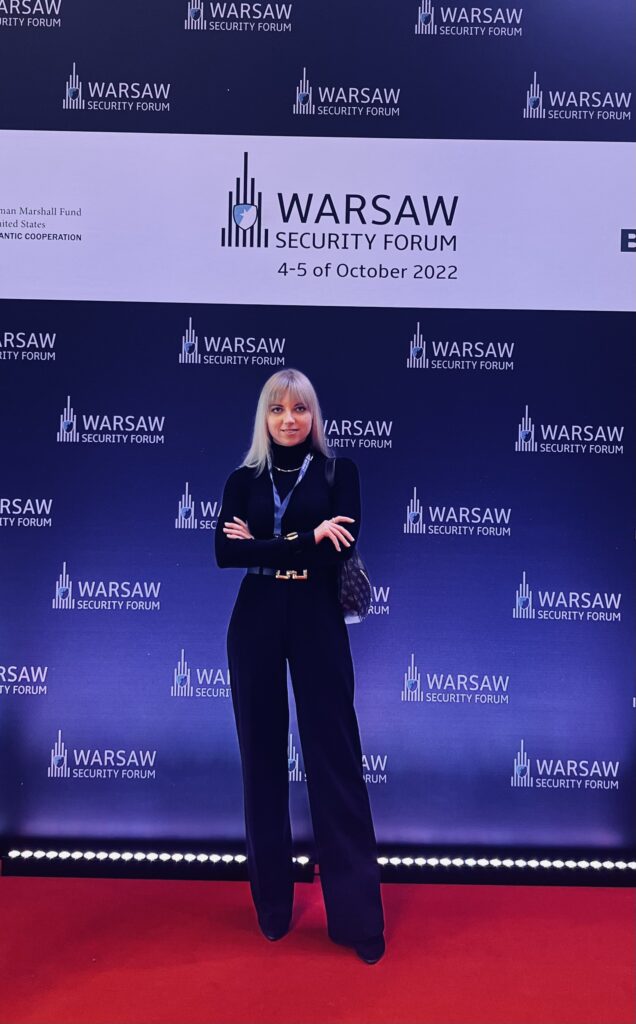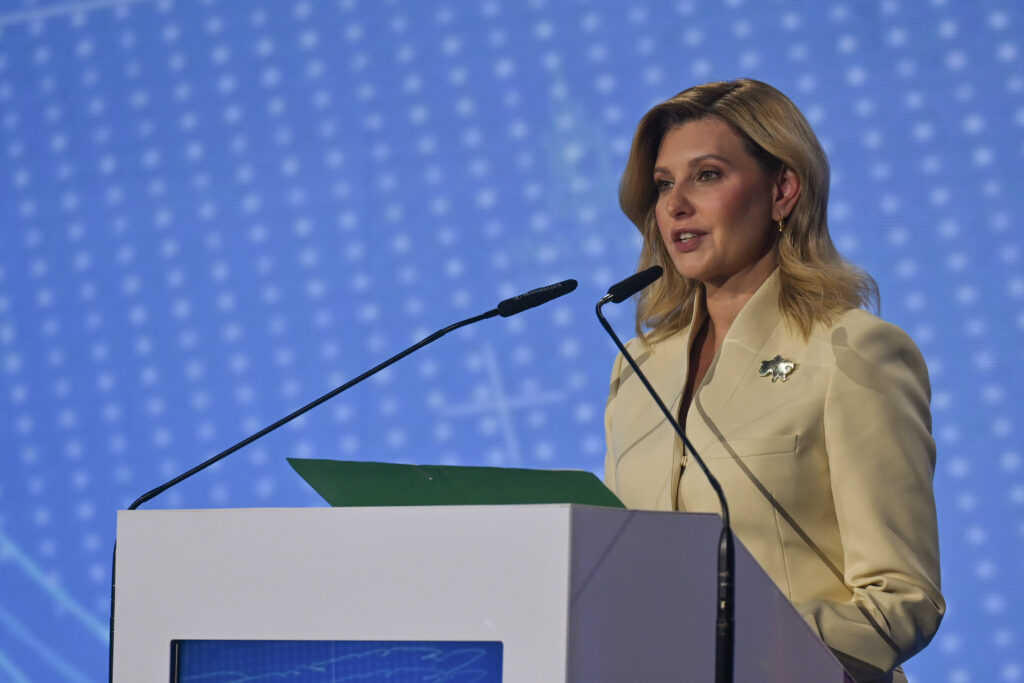
Blog: ‘Security is one of the most important priorities for our prosperity’ — the Warsaw Security Forum
In the wake of Russia’s full-scale invasion of Ukraine in February, security and its guarantees once again find themselves at the core of discussions in the international community.
In October 2022, in my capacity as a Young European Ambassador, I had a great opportunity to attend the Warsaw Security Forum, a leading European conference organised every year since 2014. The forum is co-organised by the Casimir Pulaski Foundation and the German Marshall Fund of the United States. It was created as a platform for the exchange of views between the highest representatives of governments, international institutions, industry, think tanks and experts in the fields of politics and defence. Every year, the Forum focuses on the key challenges facing the North Atlantic Alliance, the European Union and their partner countries, with particular emphasis on the security of Central and Eastern Europe.
The forum is devoted to transatlantic cooperation and is focused on elaborating shared responses to common challenges in the field of security. It is organised over two days in the form of a series of high-level panel discussions, where representatives of governments, international organisations, think tanks, industries, and civil society discuss the main challenges in the field of security. The forum is divided into tracks, which include different topics. The tracks introduced this year were the following:
- Energy Security and Climate
- Defence
- Global Outlook
- Democratic Resilience
The ‘Energy Security and Climate’ track was launched for the first time this year because of Russia’s war against Ukraine, which is carried out not only through brute military force, but also across energy infrastructure, energy resources, and hydrocarbon blackmail. Former Polish Minister of Climate and Environment Michal Kurtyka (2019-2021), said in his opening speech: “… 24th of February, Russian aggression against Ukraine, and then very recently 27th of September, sabotage of Nord Stream 2, on the same day as the opening of the Baltic Pipe, opens a completely new perspective for discussing together energy and defence issues. Even if we Europeans are not at military war with Russia, Russia is at a proxy war related to resources and energy. Stakes are rising.”
During the panels of this track, experts discussed such topics as decarbonisation, diversification, Europe’s green future, nuclear power, and possible challenges related to these topics. Riina Sikkut, Estonia’s Minister of Economic Affairs and Infrastructure told one of the panels that it was essential to break Russia’s dominant position on European gas supply. During the same panel, George Sergiu Niculescu, Romania’s Secretary of State for Energy, also stressed the need to use the energy crisis as a catalyst to accelerate the green transition, which will help to deliver energy security and implement climate policy.

Moreover, during the panel on ‘Europe’s Green Future: Climate & Security Perspective’, Christian Zinglersen Director of the EU Agency for the Cooperation of Energy Regulators said: “One lesson is clear for policymakers around Europe, that if you are very supply-side restrictive in your approach without tackling those main demand drivers of that which you wish to restrict, you either need to get alternative supplies in time or you will face a supply crunch that will have high price impact and will have an inflationary impact as well. There is a need for a less ideological more pragmatic approach to policy…” The speakers of the panels made clear that Europe needs new ways of thinking and working, and this can be done only by acting together and implementing a new energy mix in countries’ systems.
The importance of saving democratic values was underlined in the ‘Defence’ and ‘Democratic Resilience’ tracks. Such topics as resistance to threats, defence cooperation, strengthening democratic structures, as well as cybersecurity and hybrid conflicts, were introduced. Polish Defence Minister Mariusz Błaszczak told the Defence track: “The last months have changed the European landscape and environment, February 24th became a reminder for us that the horrors of a full-scale war in Europe do not necessarily belong to the past. Undoubtedly, this brings many questions on how to enhance our common security. As a result of the Russian invasion of Ukraine, we face a security crisis, which we had hoped we would never face again. A full-scale armed conflict in Europe. Russia’s aggression has proven Moscow’s neo-imperial ambition in general disregard of the European security architecture and rules-based international order.” He stressed the importance of collective defence to meet the current challenges.
Two defence panels – on heavy armour and missile defences – heard that the war in Ukraine showed that heavy armour was not a relic of the past and that the missile threat was a crucial part of the conflict, which should be taken seriously. It was stressed that these two aspects should play a huge role in the development of future defence strategies in Europe. Also, during panel discussions in the ‘Democratic Resilience’ track, the importance of saving free speech and countering disinformation campaigns was underlined. As free speech is a key plank of democratic societies, countries such as Russia use it to mislead people through disinformation campaigns. Government and society have a key role in responding to such threats.

© Artur Widak via Reuters Connect
During the ‘Global Outlook’ track, discussions took place around geopolitics, cooperation strategies between countries and international organisations, and the most current and clear threats to national and international security. Experts shared their opinions on Central and Eastern European support for Ukraine, the importance of cooperation between countries, defining and shaping the same long-term response to Russia’s Imperialism, and the importance of women in the evolving security landscape. During the panel ‘United We Stand, Divided We Fall. Our Response to the War in Ukraine’, German Foreign Minister Annalena Baerbock said: “We have to be very careful not to fall into a Russian trap, highlighting demonstrations or fake news as the majority thinking in society. We have to make sure that we are not being divided.” Every year, during the conference, the Knight of Freedom award is given to an outstanding figure who has contributed to the promotion of the values of General Casimir Pulaski, freedom, justice, and democracy. This year, the people of Ukraine received the Knight of Freedom Award for defending those values. The organisers presented the award to the first lady of Ukraine Olena Zelenska.
LATEST

How you can help the planet every day

Building Europe: Poland’s experience of joining the European Union and lessons for Ukraine

World Health Day 2024: My Health, My Right

EUREKA MEETS EUROPE – opportunities to develop and study. My experience

Can you wear pink in the workplace?
More campaign pages:
Interested in the latest news and opportunities?
This website is managed by the EU-funded Regional Communication Programme for the Eastern Neighbourhood ('EU NEIGHBOURS east’), which complements and supports the communication of the Delegations of the European Union in the Eastern partner countries, and works under the guidance of the European Commission’s Directorate-General for Neighbourhood Policy and Enlargement Negotiations, and the European External Action Service. EU NEIGHBOURS east is implemented by a GOPA PACE-led consortium. It is part of the larger Neighbourhood Communication Programme (2020-2024) for the EU's Eastern and Southern Neighbourhood, which also includes 'EU NEIGHBOURS south’ project that runs the EU Neighbours portal.

The information on this site is subject to a Disclaimer and Protection of personal data. © European Union,